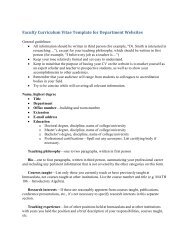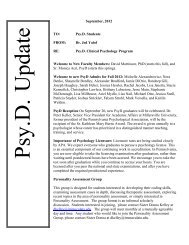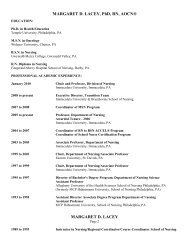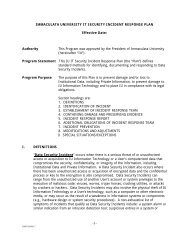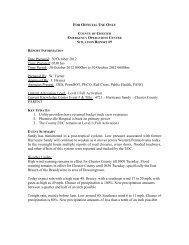8529 Cat.qxd - Immaculata University
8529 Cat.qxd - Immaculata University
8529 Cat.qxd - Immaculata University
Create successful ePaper yourself
Turn your PDF publications into a flip-book with our unique Google optimized e-Paper software.
335. Business Training Strategies (3)This course focuses on needs assessments, training styles, andforms of evaluation that may be utilized within an organization.Tools to implement each area of inquiry and why/how trainingshould be implemented within an organization for the betterment ofthe company as well as employees will be discussed. (This courseis offered on-line or in the traditional format).336. Managing Business Conflicts (3)This course addresses the sources of and the resolutions for avariety of conflicts that arise within organizations. Discussions andassignments will address the organizational leader’s roles, andresponsibilities and relationships that are critical to successfulconflict resolution. A case study approach is used to examine realworldconflict situations and methods for dealing with them.338. Business Ethics (3)This course provides students with insights into anorganization’s responsibilities to its stakeholders: employees,customers, shareholders, competitors, and the community at large.Moral principles and codes of ethics will be examined as the basisfor the standards of leading and managing a commercial enterprise.340. Topics in e-Commerce (3)This course is an introduction to the business models, strategies,and tactics of doing business in the Internet economy. The courseobjective is to build a solid knowledge of e-commerce, current e-business trends, and the fundamental underlying web technologies,which will be achieved through case studies and online activities.(This course is offered on-line or in the traditional format).348. Business Employment Law (3)This course presents a concentration of employment legal issues.Topic focus addresses views from the perspective of both theemployer and employee. Identification and implementation of relevantlaws will be discussed as well as presented within the case studyformat. (This course is offered on-line or in the traditional format).360. Business Management (3)Introduction to the structure and role of business organizations.Introduction to the structure and role of business organizations.Emphasis of discussions concentrates on the business strategies ofplanning, organizing, leading and controlling regarding policies andprocedures..365. Strategic Planning (3)A survey of current concepts, models, and practices of strategicplanning and resource allocation in a business organization.Discussions, exercises, and projects will provide practicalexperience with the development of organizational mission, visionand values statements, external and internal environmental analyses,long range goals and objectives, and implementation plans.366. Leadership Dynamics (3)This course will develop the awareness, knowledge, abilities,and skills that a professional needs in order to perform effectively inleadership positions. Areas of inquiry include examination ofindividual temperament, leadership styles, leader-followerrelationships, group and organizational dynamics, problem anddecision analysis, and conflict resolution.398-399. Business Practicum (3)An opportunity to engage in business experience in a specific area ofthe major field. The internship provides an in-depth analysis of practicalbusiness field experience to prepare students for career choices.401-402. Independent Study and Research (1-6)Designed to provide an opportunity for a junior or senior toengage in independent study and research in a specific phase of themajor field.ACCOUNTING201. Accounting and Budgeting (3)An introduction to accounting information and the basicaccounting cycle. Techniques of accounting for businesstransactions, preparation and interpretation of financial statementsfor internal control and external reporting and for use in makingsound business decisions, forecasting and budgeting methods. Maynot be substituted for ACC 203 and 204.203-204. Accounting Principles I, II (3,3)Development and application of procedures underlying theoriesof accounting principles relating to major forms of businessorganizations.205. Financial Accounting (Offered only through ACCEL ®Programs) (3)Focuses on the financial aspects of accounting, financialstatements, and applications. Emphasis is placed on three forms ofbusiness organization.206. Managerial Accounting (Offered only through ACCEL ®Programs) (3)Introduces concepts in analyzing and interpreting accountinginformation in product and service costing and the application ofthis information and statements in management planning, control,and decision-making.303-304. Intermediate Accounting I, II (3,3)Comprehensive review of accounting principles with detailedstudy of balance sheets; accounting statements analysis.(Prerequisite: Accounting 203-204).305. Intermediate Accounting III (3)Course will include in-depth coverage of selected accountingtopics, including, but not limited to, deferred income taxes,accounting for pension costs, cash flow statements, capitalizedleases, and financial statements analysis. (Prerequisite: Accounting303-304).313. Federal Income Tax (3)Study of Federal Income Tax law as it applies to individuals.(Prerequisite: Accounting 203-204).314. Advanced Taxes (3)Tax problems of partnerships, corporations, estates, trusts,deferred payments, gifts, with particular emphasis on tax planningand the role of the accountant. (Prerequisite: Accounting 313).317. Cost Accounting 1 (3)Basic cost accounting principles applied to job order, process,and standard cost systems. (Prerequisite: Accounting 203-204).318. Advanced Cost Accounting (3)Advanced cost techniques and theories, financial planning andcontrol; profit planning with direct costing; flexible budgets, breakevenand profit-volume relationships. (Prerequisite: Accounting 317).43




